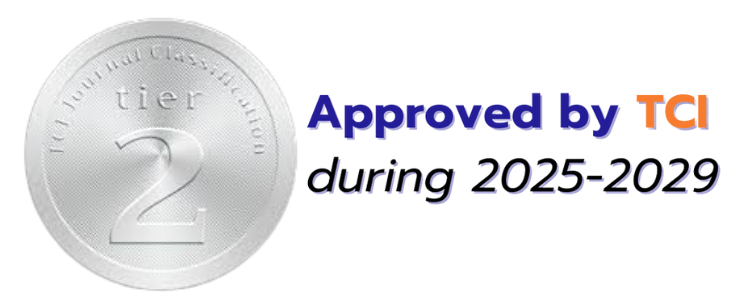The Development of Reading Comprehension for Elementary Student by Using Self-Questioning with Question Formulation Technique
Keywords:
Self-Questioning, Reading Comprehension, Question Fomulation Technique, Elementary StudentsAbstract
This research aimed 1) to compare the comprehension ability of elementary school students before and after the experiment. After learning using self-questioning with question formulation technique. The sample group includes 36 Grade 6 students at a private school, academic year 2023, Grade 6/2, which were obtained from purposive selection.
The research instruments were consisted of 1) a learning plan using the self-questioning reading method combined with the Question Formulation technique on reading for comprehension. The content validity was approved by 3 experts, index of Items-Objective Congruence: IOC was examined to determine the content reliability was 1.00 2) a test about Reading for understanding. The content validity was approved by 3 experts, index of Items-Objective Congruence: IOC was examined to determine the content reliability was 0.67. The data were analyzed by mean, standard deviation and t-test, analysis of the difference in mean reading comprehension scores at all 4 levels, namely the alphabetic reading level. Reading level Judgment level and Level of use or application.
The research findings were as follows: The average total reading comprehension score and the average reading comprehension score consists of the alphabetic reading level. Reading level Judgment level after the experiment, it was significantly higher than before the experiment at the .05 level, and the mean application or application score after the experiment was higher than before the experiment without statistical significance at .05.
Downloads
References
Atchara Pradit. (2007). Inviting Thai children to become readers. (1st ed.). Bangkok: Learning Park
Office.
Bloom, B.S., Engelhart, M.D., Furst, E.J., Hill, W.H., & Krathwohl, D.R. (1956).
Taxonomy of Educational Objectives, Handbook I: The Cognitive Domain. New York: David
McKay Co Inc.
Bromley, K. (1992). Language arts: Exploring connections. Boston: Allyn and Bacon.
Brown, A. L. (1983). The development of plans for summarizing texts. Child Development.
https://eric.ed.gov/?id=EJ285717.
Christine, C. (2008). Students' questions: a potential resource for teaching and learning
science. https://doi.org/10.1080/03057260701828101.
Janya, K. (2018). Effect of Instruction Using KWHLAQ Stagey on Reading Comprehension and the
Reading Habits of Seventh Grade Students [Master dissertation, Srinakharinwirot University].
Jirawan, I. (2011). Effects of Thai literature teaching using multi-part strategy on reading
comprehension ability, academic essay writing, and Thai literature learning achievement of
eighth grade students. [Master dissertation, Chulalongkorn University].
Jurairat, L. (2013). Thai language for communication (2nd ed). Nakhon Pathom: Silpakorn University
Press [translated].
Kamolpan Prasertsilp. (2022). the effect of using SQ6R technique and authentic materials for
improving grade six student’ reading comprehension skill.
McCallum, Mezher, Skinner & Hilton-Prillhart. (2011). Improving reading comprehension of at risk
high school students: The ART of reading program. Psychology in the Schools, 48(1), 78-86.
https://www.researchgate.net/publication/230115453_Improving_reading_comprehension_of_at-
risk_high-school_students_The_ART_of_reading_program
Miller, W. (1990). Reading comprehension activities kit. The United State of America: The Center for
Applied Research in Education.
Ministry of Education. (2022). Reading according to PISA "Reading for learning".
https://oer.learn.in.th/search_detail/ZipDownload/20155. [tranlated]
Piaget, J. 1970. Science of Education and the Psychology of the Child. New York: Orion Press.
Pattrada, I. (2021) The Teaching of Reading Analysis Via Active Learning for Developing Critical Thinking Skills of Thai Children on the Gen Z Era [Master dissertation, Burapha University].
Riley, V.M. (1991). Teacher’s Questioning for Improvement of Critical Thinking Skills.
Dissertation Abstract International [Doctoral dissertation, University of Wisconsin].
Rothstein. (2011). Make Just One Change: Teach Students to Ask Their Own Questions.
The United State of America: Harvard Education Publishing Group.
Saijai, T. (2017) . Thai language for communication. (1st ed.). Bangkok: Se-Education.
Sumalee, C. (2019). Effect of using Think Pair Share Technique with Graphic Organizer
on Thai Language reading Comprehension of fifth Grade Students [Master dissertation,
Chulalongkorn University].
Waradee, C. (2018). Research on the process of developing the skills of asking questions to find
answers in a systematic way by teaching strategies over cognition according to the special
chef model for education students at Nakhon Ratchasima Rajabhat University. Ratchapruek
Journal, 16(1),132-138.
Downloads
Published
Issue
Section
License
Copyright (c) 2024 Journal of Education and Human Development Sciences

This work is licensed under a Creative Commons Attribution-NonCommercial-NoDerivatives 4.0 International License.







